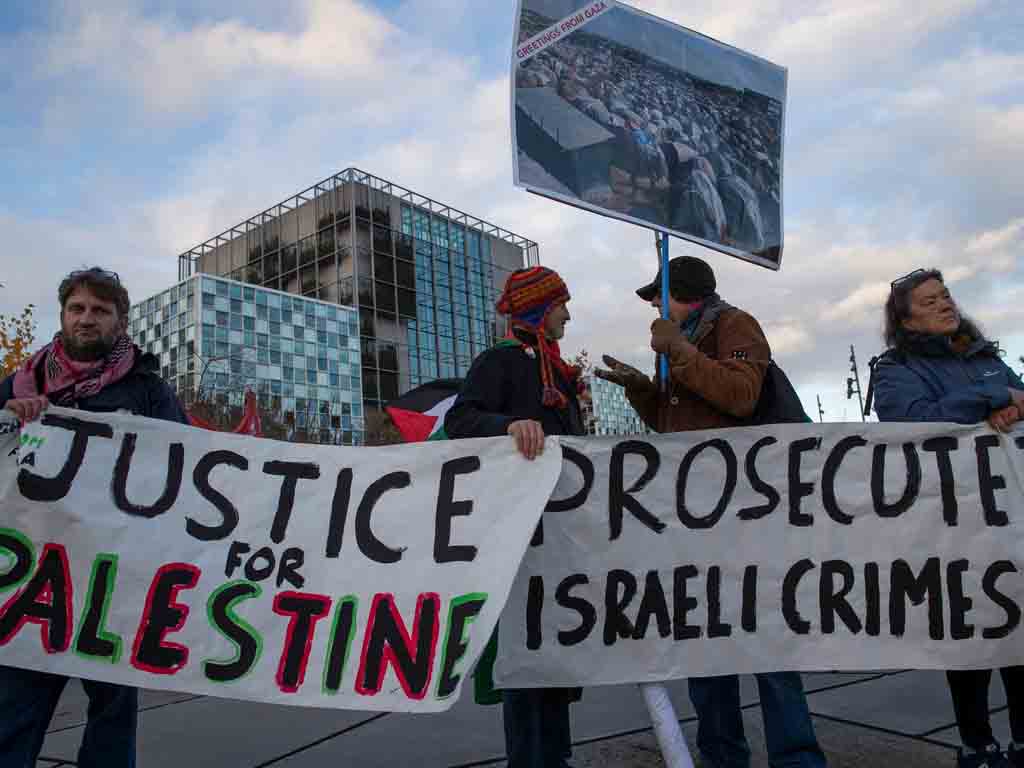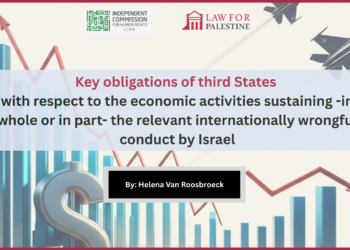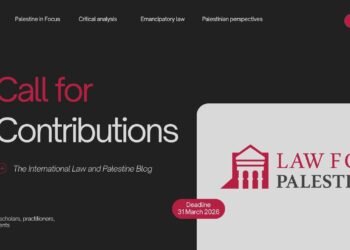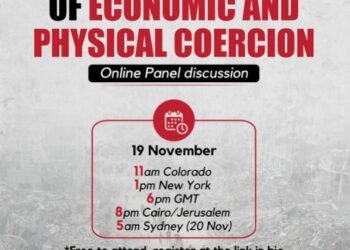Questions and Answers: What does the International Criminal Court’s Decision to Hold its Jurisdiction in Palestine Mean?
Introduction
On February 5, 20121, the Pre-Trial Chamber of the International Criminal Court (the Court) decided that the Court has territorial jurisdiction in the state of Palestine – as a party member to Rome statute- which includes the West Bank, Gaza Strip, and East Jerusalem.
This ruling by the Court’s Pre-Trial Chamber came in response to a referral made a year ago by the Court’s Prosecutor, after her conclusion that there was a reasonable basis to initiate an investigation into the crimes believed to be committed in Palestine. In the referral letter, the Court’s Prosecutor asked the Court’s Pre-Trial Chamber to decide on the scope of the territorial jurisdiction where the Court can perform its jurisdiction in Palestine (whether it includes the West Bank or Gaza Strip, or the territories classified as Area A according to Oslo Accords?)
Accordingly, tens of memorandums were presented before the Chamber by countries, organizations and academics to either persuade the Court to recognize its territorial jurisdiction or, on the contrary, persuade it to close the case. Given the recent Court’s ruling, the debate on this issue was finally settled. The Pre-Trial Chamber also ruled out that the Court has territorial jurisdiction in the 1967-Occupied Palestine.
So, what does this ruling mean? And what is its importance for the State of Palestine? On which base it was established? What are its consequences? And what are the next expected steps?
Summary of the Pre-Trial Chamber’s Decision
1. Palestine is a “state’ for the purposes of Rome Statute and its membership in the court is valid:
In its mentioned decision, the Pre-Trial Chamber assured that it is not within the Court’s jurisdiction to answer the question of whether Palestine is a state, or not, as this is considered an extremely complicated political question. But the Chamber decided that Palestine is a member–state to the Rome statute; and it is considered “the State on the territory of which the conduct in question occurred” according to article 12(2) (a) of the Statute.
Also, in the details, the Chamber explained that pursuant to Article 125 (3) of the Rome Statute, the statute is open to signature by all States, and the state wishing to sign deposits its instruments of accession to the United Nations Secretary-General.
Article 119 (2) of the statute has also stipulated that “Any other dispute between two or more States Parties relating to the interpretation or application of this Statute which is not settled through negotiations within three months of their commencement shall be referred to the Assembly of States Parties”.
The Pre-Trial Chamber noticed that the United Nations Secretary-General, in the exercise of his duties, takes guidance on whether Palestine is a state or not from the resolutions of the United Nations General Assembly. For this reason, the 2012-General Assembly resolution 67 /19, which grants Palestine the status of “a non-member observer state in the United Nations”, enables Palestine to become a party to any treaty open to states.
The Chamber also indicated that the Secretary-General of the United Nations had distributed the document of Palestine’s accession to the Rome Statute to the states parties, and no state party at the time, with the exception of Canada, expressed any opposition. After its accession, Palestine played an active role in the Assembly of State Parties, and the representatives of Palestine participated in the meetings and submitted proposals, a right that only state parties possess, on the other hand Palestine has also contributed to the budget of the Court.
Although seven countries – Czech Republic, Austria, Australia, Hungary, Germany, Brazil and Uganda – have lately presented before the Court their objections to the acceptance of Palestine as a party state, these countries kept silent when Palestine joined in 2015, and they did not then or later made opposition to its acceptance as a party member before the Assembly of State Parties. Therefore, Palestine’s accession to the Rome statute followed the correct procedures.
The Court also affirmed that this assessment enables the Prosecutor to fulfill its commitment to initiate an investigation in the current situation, a matter that eventually, pursuant to the Rome Statute, would allow the Court to exercise its jurisdiction over individuals who have committed crimes within its jurisdiction. This is consistent with the Court’s purpose of ending impunity by establishing individual criminal responsibility for crimes.
2. The Court has Jurisdiction over the Alleged Persecuted Crimes in the 1967-Occupied Palestinian Territories
The Chamber clarified that pursuant to the 2012 United Nations’ resolution 67(19), the territory of the State of Palestine includes the West Bank, the Gaza Strip and East Jerusalem. Consequently, the Court’s Jurisdiction applies to this region. And since the parties, in Oslo Accords, did not agree on specific boundaries, the Palestinian State borders remain as defined by the International Law.
The Chamber also noted in its decision that any interpretation or application of the Statute must be consistent with the internationally-recognized human rights. Among these is the right to self-determination, which has been explicitly recognized to the Palestinian people by various bodies, including the International Court of Justice. Also, the United Nations General Assembly has continuously linked the Palestinians’ right to self-determination with the Palestinian Territories demarcated by the Green Line. The General Assembly also stressed the need to respect those territories’ unity and preserve their integrity. In addition, the United Nations Security Council reiterated those considerations and asserted that it will not recognize any change to the borders of June 4th, 1967, including those of East Jerusalem.
Consequently, the Pre-Trial Chamber found that the Court’s Territorial Jurisdiction on Palestine extends to include the territories Israel occupied in 1967, i.e. the West Bank, Gaza Strip and East Jerusalem.
3.The Oslo Accords Does not Affect the Court’s Exercise of its Jurisdiction:
The Pre-Trial Chamber clarified its view on the argument concerning the Oslo Accords, signed by the Israeli government and the PLO in 1993, and its alleged prevention to Palestinian local Judiciary from trying Israeli citizens which would mean, if approved, that Palestine does not originally have territorial Jurisdiction, and thus cannot grant this Jurisdiction to the Court.
The Chamber explained that this matter is not related to the Chamber’s endorsement of the Court’s Territorial Jurisdiction in Palestine, rather it can be raised when and if the Court’s Prosecutor issues “writ of summons” or “arrest-order” against the accused. This is because it would be then possible to claim that, pursuant to article 98 of the Rome statute, the implementation of Palestine’s request would require it to breach an already established treaty obligation that was pledged for another country. Article 98 of the Rome statute stipulates that the Court may not make an application for a state that might cause inconsistency with its obligations under the rules of diplomatic immunity or agreements that limit its power.
4. The State of Israel is not a Party to the Rome statute, to what extent the Chamber’s Decision is Important to this Issue?
Even though Israel is not a party to the Rome statute, this does not affect in anyway the Court’s territorial jurisdiction in the State of Palestine. Pursuant to Article (13) of the Rome Statute, it is sufficient for the court to exercise its jurisdiction to hold accountable the perpetrators of the crimes that have been committed on the territory of a state party, and since the State of Palestine is a party to the Rome Statute, the Court has the right to exercise its jurisdiction over the territory of the State of Palestine, regardless of membership status of the state of Israel.
5. Israel is not present in the Court’s Deliberations, Is it Permissible to Rule on an Issue that Affects it without it Being Present (The Gold Criticism Principle)?
The court, in this context, responded by saying that this issue is related to the borders and the region over which the court exercises its jurisdiction. The court is competent to consider criminal liability as long as it is committed on the territory of a state party to the Court, and the Court must resolve this issue and determine the territories over which it can exercise its jurisdiction.
Especially that the Israeli Judiciary is not willing to take any real action to try the war criminals, while the Palestinian Judiciary is not able to exercise this authority because of the restrictions imposed since 1967 in the military orders, according to which Israel has prevented the trial of Israeli citizens before Palestinian courts. These restrictions were reinforced and confirmed by the Oslo Accords.
In all matters, the Court asserted that its decision is strictly limited to the question of the Judicial authority stated in the Prosecutor’s request and does not include any decision concerning the territorial disputes between Israel and Palestine. Consequently, the current decision cannot be interpreted as one pertinent to the legal issue arising from the conditions in Palestine, whether under the Rome Statute or any other field of International Law.
6. Hamas Control Over the Gaza Strip, How Did the Court Deal with this Issue?
The Court did not directly address this issue, but it is implicitly understood from the Court’s decision to deal with the Palestinian territories as one geographical unit irrespective of who controls it. This matter depends on a legal criterion that considers a specified land to fall within the jurisdiction of the Court as long as it belongs to the state party regardless of who controls it.
Notices on Issues Not Addressed in the Court’s Decision
7. According to the Oslo Accords, Palestinian Courts May not try Israeli citizens, to what extent does this have an Impact?
Even though Israeli citizens may not be tried before the Palestinian Judiciary, this does not prevent the Court’s authority to start taking effect on the land of the State of Palestine. This is for several reasons, most importantly, is that the Oslo Accords could not violate international law, and if they did, they would be void. The priority here is for the protection of civilians’ rights, we especially refer in this matter to the Fourth Geneva Convention (GCIV) on the protection of civilians in times of armed conflict. This convention takes precedence over all other signed agreements – e.g., the Oslo Accords – which can harm the interests and the rights of the civilian population. In addition, the Court exercises its jurisdiction through a State-Party referral, in this case the State of Palestine, as State Party that made an application to start an investigation into the crimes it claims were committed over its region. As previously explained, the Chamber addressed this point and made it clear that these matters will be dealt with if and when the Prosecutor decides to issue arrest- orders or writ of summons. More importantly, the Court noticed that the Palestinian Judiciary is unable to prosecute and the Israeli is unwilling to, and consequently, the trial authority was delegated to the Court pursuant to the complementarity principle.
8. What is the Court’s Temporal Jurisdiction?
In general, the Court’s Jurisdiction applies to crimes committed after July 1, 2002, the date on which the Rome Statute entered into force. In the case of the State of Palestine, the Court’s Jurisdiction is supposed to apply from the time Palestine officially became a member of the Court, i.e. April 2015. But article 12(3) of the Rome Statute, expounds that the state can ask the Court to exercise its authority on crimes that were committed before the Rome statute has taken effect over its territories. This is exactly what Palestine did, as it filed an application with the Court, in which, it declared its endorsement of the Court’s jurisdiction in the State of Palestine as from June 13, 2014, that is from the beginning of the war on Gaza which lasted for more than 50 days.
9. What are the Crimes that Will Be Investigated and Could They, For Example, Include Other Countries that provide Israel with Weapons?
It is important to first note that the Pre-Trial Chamber pointed out that even though the Prosecutor did not officially declare its initiation of an investigation, this investigation, from the legal perspective, has already started. In addition, the Prosecutor has specified number of potential cases for admissibility purposes, of these were crimes claimed to be committed by the Israeli authority, Hamas, and other Palestinian military groups.
In principle, the Court can investigate war crimes (such as indiscriminate killing, property demolition and settlement activities). This was mentioned in the Prosecutor’s report a year ago. However, the court can also investigate other crimes, such as apartheid and crimes against humanity, but this would require the submission of files, documents and evidence supporting claims that such crimes were committed in Palestine.
Concerning the inclusion of other countries, this is pertinent to the rules of criminal law. But in principle, of course, if it is proved that there is substantial participation by other countries or even companies in the actions that constitute war crimes in Palestine, then this will be within the scope of the Court’s jurisdiction.
10. Can We Witness Trials for Palestinian Members of Armed Groups Before the Court?
In fact, the Prosecutor had referred to war crimes that armed Palestinian groups had possibly committed, such as indiscriminate missiles and the use of civilians as human shields, a matter that the Court briefly touched upon. The coming days will hold a further clarification over the matter. Meanwhile we need to take into consideration several issues, such as the right to self-determination, from which stems the right to resistance, and the right to self-defense, as many of those resistance actions were committed in self-defense- this is not, in any way, to justify committing violations. Moreover, many leaders and activists in these armed groups have been tried by Israel and were sentenced to long imprisonment sentences; and it is not permissible according to the Court’s principles to prosecute the same act twice.
11. What is the Importance and Consequences of the Court’s Decision?
This decision was the outcome of a long legal battle before the Court; that started in 2009 and ended on February 5, 2021: a historical day for the issue of Palestine and the Israeli occupation. Without the hard work and effort spent in presenting the legal arguments before the Court, we would not have reached this decision. The importance of this decision is that the Court deals with Palestine as a state party to the Rome statute, on equal foot with other state parties to the statute, and that its borders for the purposes of the Court’s Territorial Jurisdiction is the 1967-boarders, i.e. the West Bank, Gaza Strip and East Jerusalem. Which in turn refutes all the claims presented before the Court regarding lack of statehood for the state of Palestine and consequently lack of ability to enjoy a membership to the Rome Statute.
The Court also said that borders were defined by the International Law and this refutes all the claims arguing that the borders of the State of Palestine were up to the political solution and negotiations organized by the Oslo Accords to decide. The Court clearly stated that the parties can agree on whatever they want but as far as they are not yet in agreement, the present borders are based on the rule of International Law. Despite the importance of this decision, its significance goes beyond the Chamber’s endorsement of its Territorial Jurisdiction in the State of Palestine and extends to include other issues in the international context. As it is understood from the decision that it is time that Israel stops its continuous crimes against the Palestinians.
This decision establishes a good foundation for the State of Palestine to start looking into other issues such as settlements, East Jerusalem, the displacement of its population, borders and refugees’ right to return. In brief, this decision opens the opportunity for a new legal battle that requires the Palestinians and their supporters to start preparing their arguments and complaints and define the list of crimes and those responsible for them.
12. What is the Impact of the Sanctions imposed by the U.S. on the Court’s Members?
In this stance, the Court proved to be brave in favor of justice away from the position of any country that has exerted pressure on it. The new U.S. administration seems to be supportive to justice as can be understood from the statement it had issued after the announcement of the Court’s decision. It is thus hoped that this administration will lift the sanctions imposed on the Court’s members.
13. What’s next? What are the following steps?
Ahead is a delicate time that requires a professional cadre to harvest the fruits of this accumulated effort. The time ahead requires Palestinians to exert efforts away from any political influence and work hand in hand with academics, experts, jurists and researchers in order to carefully and legally support their work on issues regarding the Prisoners, Settlements, Racial segregation/Apartheid, Displacement and the War on Gaza. Palestinians should also work to assign the crimes to their perpetrators while keep documenting Israeli crimes and violations. It is also necessary to clear Palestinians before the Court from some crimes while prove them on the Israeli side.
This also needs to allocate a budget with large funds to enforce legal efforts on Palestine before the Court. Further it requires the restructuring of the High Palestinian National Committee, responsible for the Court’s file, to include professional legal cadres and to broaden the scope of its work.
On the other side, the Palestinian Bar Association, which played an important role in reaching this decision, through its memorandums to the Court, has a further responsibility today to create legal cadres of international lawyers from among the members of its public body.
There is also a role entrusted to the families of Palestinian victims, the Public Prosecution, and human rights activists through their legal follow-up with the work of the Court, and their submission of reports and testimonies concerning pending and potential cases before the court.
Finally, we must work to implement the Rome Statute in the Palestinian legal system, in order to activate the criminal prosecution of perpetrators of international crimes before Palestinian national courts which will in turn strengthen the principle of complementarity between international and national criminal justice.
Note: this is a summary of a webinar with Dr. Mutaz Qafisheh, Professor of International Law and the Representative of the Palestinian Bar Association before the Court. The summary includes the interview contents and does not necessarily reflect the opinion of the Law for Palestine.







